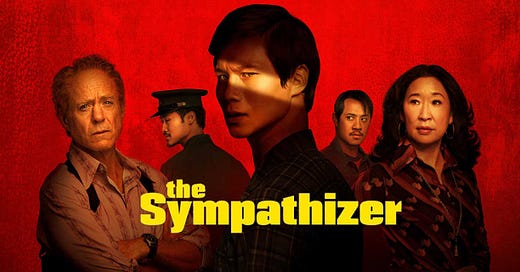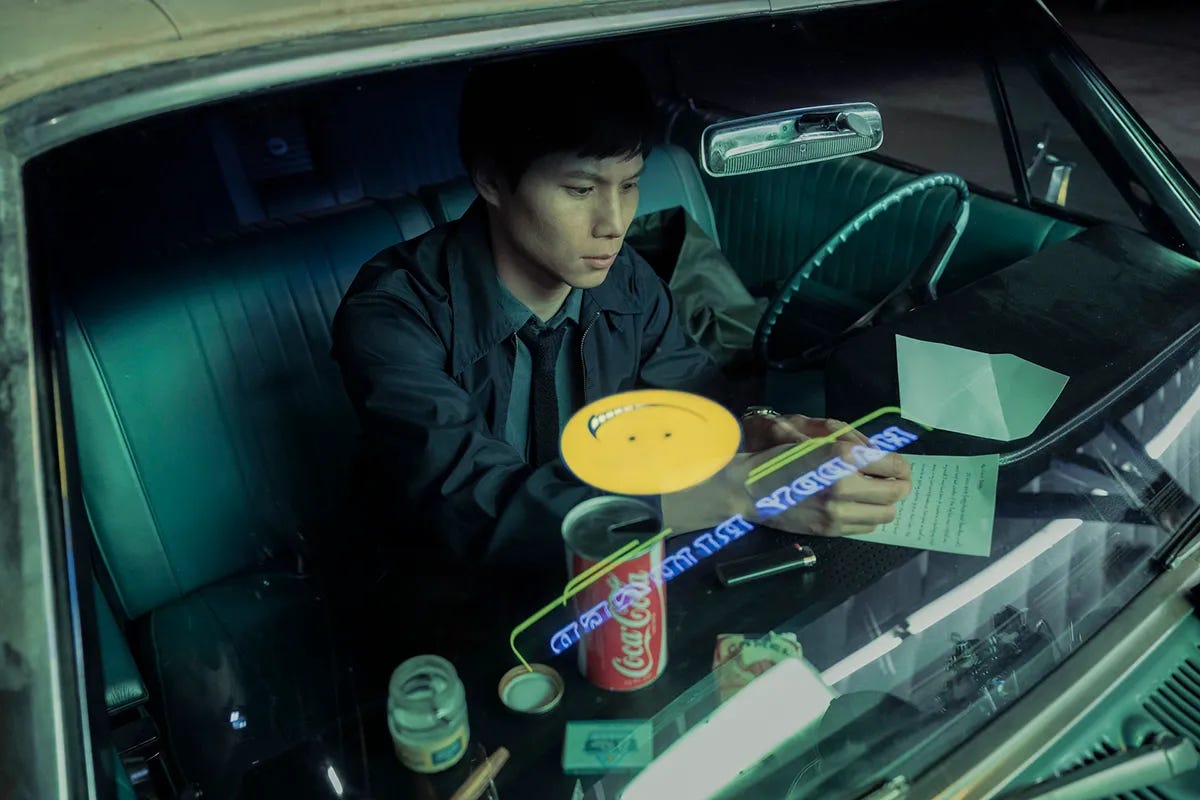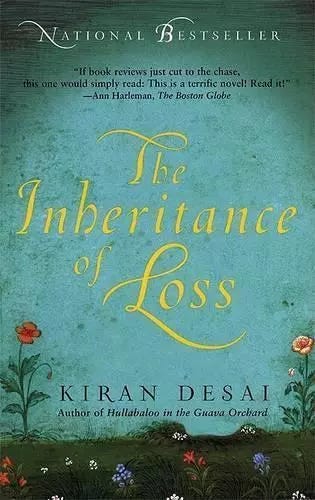The Sympathizer - Was the TV Series Better?
Where we discuss The Sympathizer by Viet Thanh Nguyen and compare the book with the HBO TV series
We recently discussed The Sympathizer by Viet Thanh Nguyen on The Novel Tea. Shruti and I had a lot of opinions, questions, and debates about this book and briefly discussed the screen adaptation. You can listen to the full episode here:
*this newsletter includes minor plot spoilers for The Sympathizer*
Getting Into the TV Series
It’s always an interesting experience when watching a screenplay adaptation of a book you have just finished. Being an avid reader, it’s not as common for the movie/series to be better than the book (for me, at least), so my expectations are always slightly skewed even before starting the show. However, Viet Thanh Nguyen’s writing style in the book was so unique and vivid that I did have a hunch that I would enjoy the show.
The general aura of the book was a mix of dark humor, political drama, and war action. The tone of the narration came off as sarcastic and multifaceted, as there were many euphemisms, subtle comparisons, and “double-edged sword” phrases sprinkled into the story. I was curious to see how the comedy aspect would be translated on screen without taking away from the seriousness of the plot.
The cinematography took charge of the sarcastic dialogue of the narrator and the complex interactions between the characters in the best way. Right off the bat, the first things I noticed about the show were the colors and filters.
The frames looked vintage and grainy, which evoked the feeling of a memory, or something that was not happening in the present tense. I paired this interpretation with the vivid primary colors as a way of them trying to tell us that though this is a memory, certain things were being emphasized or focused on that made these images untruthful or unrealistic in some way. As most of the scenes were being played out from the narrator’s confession, was this unique filter chosen to show that the confession itself was filtered in a way? I think it is also a fun nod to the original color scheme of the novel as its book cover also has very bright reds and yellows.
In this article by the Nab Show, Jon Silberg talks about the show’s color theory and how the camera angles and shadows play an important part in the overall message of the story as well.
A concept that took me aback initially while starting the show was the cast. The fact that Robert Downy Jr. plays a CIA spymaster, an academic professor, an anti-communist congressman, and a filmmaker was one of the most interesting choices I have seen in media.
The book starts out with a quote from the unnamed narrator saying:
I am a spy, a sleeper, a spook, a man of two faces.
This quote speaks volumes throughout the novel and emphasizes the theme of duality throughout the story. I think they took this quote to the next level with the multiple personalities of RDJ. As we are watching the series as a confessional, this choice makes me think that all four of these characters had a similar projection from the narrator. It reminded me of when you have a dream where a stranger or an unknown character may appear, their face may not be fully flushed out or clear in your mind but you still know who they are. I loved the idea of putting this into the film by having the same person portray different people and thought that in a book that was overflowing with symbolism and reading between the lines, this was a perfect way to adapt to the screen.
“I feel like the exploitation and appropriation and marginalization of peoples is something that I witnessed in my many decades in this medium of film and TV,” Downey said. “It was really interesting to have the mirror held up and say, ‘How would you like to represent all of the different ways in which you’ve witnessed these degrading acts take place in society, in media, in the way the culture assumes the other is meant to be made small and just part of its story?’”
—Variety
Was the Show Better?
In this interview with Viet Thanh Nguyen, the author says that he wrote The Sympathizer as a mode of resistance against the idea that “minority writers are expected to be translators to majority audiences” and that “the novel’s story is, in one dimension, a translation of American culture to a Vietnamese person.”
It is clear that the author has things he would like to say and get through to the audience, but it is all pretty cryptic and not straightforward. He speaks in comparisons and riddles and although it doesn’t take a rocket scientist to analyze his verbiage, it does make the reader stop and think for a while. Because he is not writing to cater to an American audience, it does take a little extra effort to get on the same wavelength as the author.
However, the HBO TV series did not do this justice. I feel like the show was altered to cater to an American audience (which makes sense because it was created by Hollywood producers), but it took away some of the complexity and intelligence of the novel. This Huffpost article talks in detail about how the screen adaptation was watered down and that the audience for the series was not trusted enough to piece the information and story together themselves.
Despite agreeing with this, I do think that the HBO series was marginally better than the book. While reading some of the passages in the novel, I knew that it would translate so well on screen and I think the “political thriller” aspect shines much better through visual imagery. The book was dense in its writing style, and though I don’t think there’s anything wrong with that, the HBO series transformed the story into something more palatable and enjoyable.
What did you think? Did you like the book better? Let us know in the comments!
—Neha
Up Next
Next week we will be discussing The Inheritance of Loss by Kiran Desai. In an isolated house in the Himalayas, a judge, his granddaughter Sai, and their cook live together while the cook’s son Biju is trying to create a new life for himself in the United States. In this episode, we cover the effects of post-colonialism and the difficulties of adulthood and immigration. Tune in to The Novel Tea on September 18th, 2024 to listen!









Thanks for sharing your thoughts on the adaptation! I’m obsessed with the novel (as you can see: https://thenewwhat.substack.com/p/5-literary-allusions-you-cant-miss) but haven’t had the chance to watch the TV series, so I really appreciated it. And I’ll be sure to check out your podcast episode, too!
Speaking of which, did you know that there’s an official HBO tie-in podcast for The Sympathizer series??